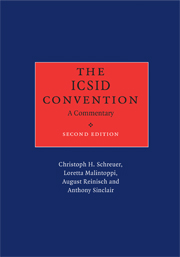Book contents
- Frontmatter
- Contents
- Foreword by Professor Sir Elihu Lauterpacht, CBE, QC
- Authors' preface to the second edition
- Table of cases
- List of abbreviations
- Text of the ICSID Convention
- Procedural calendar
- PREAMBLE
- CHAPTER I International Centre for Settlement of Investment Disputes
- CHAPTER II Jurisdiction of the Centre
- CHAPTER III Conciliation
- Article 28 Request for Conciliation
- Article 29 Composition of Commission
- Article 30 Appointment by Chairman
- Article 31 Qualities of Conciliators
- Article 32 Decision on Jurisdiction
- Article 33 Rules on Procedure
- Article 34 Conciliation Proceedings and Report
- Article 35 Non-Invocation in Subsequent Proceedings
- CHAPTER IV Arbitration
- CHAPTER V Replacement and Disqualification of Conciliators and Arbitrators
- CHAPTER VI Cost of Proceedings
- CHAPTER VII Place of Proceedings
- CHAPTER VIII Disputes between Contracting States
- CHAPTER IX Amendment
- CHAPTER X Final Provisions
- Final Clause
- Consolidated bibliography
- Index by article
- Index by subject
Article 34 - Conciliation Proceedings and Report
from CHAPTER III - Conciliation
Published online by Cambridge University Press: 07 September 2010
- Frontmatter
- Contents
- Foreword by Professor Sir Elihu Lauterpacht, CBE, QC
- Authors' preface to the second edition
- Table of cases
- List of abbreviations
- Text of the ICSID Convention
- Procedural calendar
- PREAMBLE
- CHAPTER I International Centre for Settlement of Investment Disputes
- CHAPTER II Jurisdiction of the Centre
- CHAPTER III Conciliation
- Article 28 Request for Conciliation
- Article 29 Composition of Commission
- Article 30 Appointment by Chairman
- Article 31 Qualities of Conciliators
- Article 32 Decision on Jurisdiction
- Article 33 Rules on Procedure
- Article 34 Conciliation Proceedings and Report
- Article 35 Non-Invocation in Subsequent Proceedings
- CHAPTER IV Arbitration
- CHAPTER V Replacement and Disqualification of Conciliators and Arbitrators
- CHAPTER VI Cost of Proceedings
- CHAPTER VII Place of Proceedings
- CHAPTER VIII Disputes between Contracting States
- CHAPTER IX Amendment
- CHAPTER X Final Provisions
- Final Clause
- Consolidated bibliography
- Index by article
- Index by subject
Summary
INTRODUCTION
Art. 34 is the Convention's core Article on conciliation. Under the Convention's general scheme, conciliation and arbitration are equivalent methods of dispute settlement. This equivalence was maintained despite doubts concerning the usefulness or effectiveness of conciliation during the Convention's drafting (History, Vol. II, pp. 263, 265, 415). The Convention has separate Chapters on Conciliation (Chapter III, Arts. 28–35) and Arbitration (Chapter IV, Arts. 36–55). Other parts of the Convention are common to both types of procedures. These common provisions include Art. 25, dealing with jurisdiction, Chapter V, dealing with the replacement and disqualification of conciliators and arbitrators, Chapter VI, dealing with the cost of proceedings, and Chapter VII, dealing with the place of proceedings.
Conciliation is not based on an adversarial procedure resulting in a binding third party decision. Rather, it is directed towards an agreed settlement. The procedure is relatively informal. Conciliation requires a certain degree of flexibility and goodwill from the parties.
Conciliation is particularly appropriate where the parties are prepared to continue their cooperation on the investment. Arbitration will, typically, be used where the parties have reached the end of their business relationship. Conciliation has also been regarded as particularly attractive for cultures that are less favourably disposed towards adversarial procedures such as China.
- Type
- Chapter
- Information
- The ICSID ConventionA Commentary, pp. 443 - 452Publisher: Cambridge University PressPrint publication year: 2009



